In my post entitled, Who will benefit from Apple’s $350 billion investment?, I cited data stating that less than 10% of Science, Technology, Engineering and Mathematics (STEM) degree holders are African American – a staggering number as these are some of the highest paying careers today. With the first principle of my blog being “Creating Ecosystems of Success”, and one of my focuses being awareness of the STEM careers, I wanted to tell my story.
Thus far I’ve published posts discussing the ‘Biomedical’ sciences I’ve been trained in, ‘Regulatory’ science, the ‘Applied’ sciences, and the ‘Transferrable’ skills learned when earning STEM degrees. In these posts I’ve attempted to make these sciences easily understandable for students and families with backgrounds like my own (see the story of my blog). Potentially the most important story of all though is how one becomes a STEM professional.
I’m a firm believer in teaching the ‘how’. It’s important to encourage participation in the STEMs, but as a student who walked into my training not fully understanding the opportunity in front of me, I think it’s also important to share what went into earning my STEM degree in a very open and honest way – the good, the bad and the ugly – no fairy tales and no magic. In this post, I’m thus revisiting both my learning points science-wise, and some personal challenges during the process as an African American male coming from Buffalo’s east side. The latter challenges may surprise you.
The majority of the visuals used in this piece are materials from my thesis. Click on any of them to enlarge them. Lastly in this piece I refer to my thesis project without getting into its specifics. I describe it in greater detail in my Basic Sciences and Basic Research post.
Learning how to do Science
I fell in love with “Life Science” in the seventh grade at Campus West in Buffalo, NY. I followed that love into Hutch-Tech High School where I majored in ‘Biotechnology’ (AP Biology). At Johnson C. Smith University (JCSU), I distinguished myself as a ‘A’ student in my core courses as a Biology major which led to my participation in the Ronald E. McNair Program, where I worked two summers in a Hepatic (Liver) Physiology lab.
It was my first time performing ‘Basic’ scientific research (see my Basic Sciences and Research post). I earned an undergraduate fellowship from the Environmental Protection Agency my last two years at JCSU. This precluded my participation in the ‘Minority Access to Research Careers’ (MARC) Program where I would’ve worked on a research project year-round, and would’ve gained more valuable experience.
Having participated in the McNair Program, I decided to pursue a Ph.D. in Pharmacology, thinking that working in a Pharmaceutical company like Pfizer or Merck would provide stable employment. Thus, the sole focus for my science training was finding a job. While a Ph.D. in Pharmacology would help me get there, I didn’t completely understand what the road to a Ph.D. in this particular STEM field entailed, as I didn’t yet know how to do science fulltime.
Rigorous Scientific Research
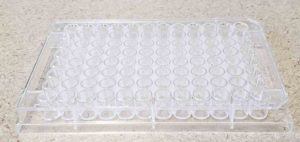
“Anwar has never done rigorous scientific research before,” my Graduate Advisor, a fellow Western New Yorker, wrote in my evaluation for my second lab rotation within the Department of Pharmacology of the University of Michigan. He gave me an ‘A’ which I was happy about, though based upon his statement, I wasn’t sure how I’d done in the lab. Did I perform adequately over those four months? Did I underperform, but still received an ‘A’ just because? Either way, he allowed me work under him for my thesis project – perhaps seeing some potential in me.
What made me want to stay in his lab? After my summers in the McNair Program, I knew something about the enzyme my Graduate Advisor’s lab worked on; “Neuronal Nitric Oxide Synthase” (see my Basic Sciences and Research post). I was also encouraged by two more senior students in another lab to stay based upon my advisor’s: talent, his productive track record and the productivity of his students.
By the way, in the coming years when prospective students would visit our department, my Graduate Advisor was always very adamant about the prospects getting the current students’ perspectives on the department. I think his reasons were that doctoral research is a significant life and time commitment as you’ll see later, and it’s in a student’s best interest not to walk into a department ‘blind’. Ideally, they should have a feel for the overall climate of their prospective department; its culture, its faculty and whether its students go on to establish their own careers.
The Basic Sciences and Research
The Basic Sciences and Basic Research are worlds all in themselves, worlds I initially didn’t know how to succeed in. Aside from some of my teachers in high school, there were no STEM professionals in my ecosystem in Buffalo. Also, once again, while my summers in the McNair Program gave me a taste of this new adventure I was embarking upon, they didn’t show what the experience would be like fulltime.
What qualities and attributes were needed to earn my Ph.D. in the STEM field I had chosen? One very important quality/value I received from my home ecosystem was that of hard work and the importance of doing quality work. I’ll credit my mother for this and her many years of making us do chores at home, which instilled a sense of personal responsibility and pride in my work. Also, the adversity-filled experience on my high school basketball team taught me how not to quit on things when they got hard – another valuable tool. Lastly, I was always naturally very malleable personality-wise, and open to being taught.
My Dad’s words about excelling in my coursework helped me to get into Graduate School and were useful until the end of my coursework. Once the fulltime research phase began however, it was a whole different ballgame, as working for my Graduate Advisor required a host of other ‘tools’.
I myself was a ‘project’ going into my Graduate Advisor’s lab – one which needed to be built from the ground up. There were plenty of challenging times for both of us as my first two to three years were spent literally just figuring things out. Fortunately, he was willing to teach me as long as I was willing to do the work and be taught. What do I mean by figuring things out? The following is a summary of what I learned as I worked on my thesis project:
Learning to ask Questions, to be Inquisitive and to Talk about Science
I added this learning point in last, but it may be the most important of all. I’ll credit the whole department for teaching me this lesson. One classmate and one professor stand out here. Verbally asking questions is essential to doing science. In my Basic Sciences and Basic Research post, I described how our experiments were questions themselves, but it’s also very important to be able to verbally ask questions of peers about their science both one on one, and in group settings in a respectful way.
During graduate school, I sat in on numerous seminars, and I was initially afraid to ask questions in front of everyone else. Part of it was a fear of sounding foolish. The other part of it was that while I’d excelled in my coursework as an undergraduate, I didn’t regularly talk about science with my classmates at my undergraduate institution. Over time I overcame my fears and got to the point where getting my questions answered superseded everything else.
Seeing and Understanding the Science through my Advisor’s Eyes
“You’re going to have to drive the project!” My biggest learning point was learning to see the science through my Graduate Advisor’s eyes, and not just in terms of obtaining my Ph.D. and finding a job. There was an ‘art’ to science, a thought process, a methodology, a culture and a lifestyle. It took about five years of training to get to the point where I could start see the science the way he saw it, and even talk about my project the way he talked about it.
I needed to understand the science in its entirety and appreciate the process, and all the challenges involved. I needed to approach my research like a professional; to design my experiments systematically and proactively – to think about the limitations of our experiments and the data we generated, to think of the next steps, and to always think about the final published paper.
Doing Science in the Lab Everyday vs. Learning about it in the Classroom
There’s a major difference between learning about science in a classroom setting, and actually doing quality science fulltime. For me that involved being proactive about my work, and being consistent in everything I did experimentally, in my writings and my presentations. Our experiments were questions, the results were the answers, and we needed the answers in a timely fashion. Everything needed to be approached with a sense of urgency, and in a way, time was our enemy. It also involved thinking about the project when outside of the lab – something my Advisor and his peers and competitors did – sometimes at the expense of other things.
I was now out on the edges of science in the ‘trenches’, trying to discover new knowledge. A major part of this involved approaching my thesis project like a job. And in many ways it was, as my peers and I received stipends. It wasn’t a high-paying job in terms of salary, but instead the payment was knowledge and wisdom which would equate to greater financial compensation later.
Graduate Research is in part a Job or an Apprenticeships line one of the Skill Trades
“This is your job now!” My Graduate Advisor and I had this conversation after my completing two years of coursework and starting my thesis project fulltime. I hadn’t made the connection yet that my research involved being in the lab 100% of the time. It required being on time in a job-like setting where I’d work on my project daily at a work bench – sometimes at night and on weekends. The data generated from my project would be published in scientific journals, as well as when my Graduate Advisor sought to renew his own research grants. Finally, it would be the basis for my completed dissertation, in addition to a record of my productivity after eventually leaving his lab.
Learning to Multitask
I had to learn to work smart, and not just hard. My Graduate Advisor instilled in me the ability to multitask and to, “have multiple things going at once,” as he always emphasized. In addition to working on my own project, I was also responsible for growing the stocks of proteins that the entire lab used, which was a huge responsibility. I was also the lab’s “Chemical Safety” officer who was responsible for all the lab’s waste disposal – chemical and radioactive. Multitasking was what he did on a grander scale all year. As a student, it seemed unfair at the time, but it’s a skill that has transcended our lab into other arenas, as with everything he taught us.
Learning to Compete and the Culture of Science
“You have to know where the line is, and then do your best to stay above it,” my Graduate Advisor told me years later after I graduated. Though I didn’t understand it at the time, he was teaching his students how to compete and survive. It’s not widely discussed, but science is about competition, especially in academia where at any given time, multiple labs around the country, and even around the world, are working to make the same scientific breakthrough. It’s an arena where ultimately, the group who makes the finding first gets the fame and notoriety, and future grant funding.
There was such a thing as being ‘scooped’. This is when another lab made the finding first, leaving its competitors to either disprove it, to add something to it, or to work on something else altogether. Because my Advisor was so talented and hungry, it never happened to us, but I saw it happen to some of my peers and their labs. Nothing was guaranteed. Just like he had to fight and claw to keep his lab running, I also had to fight and claw to push my project through to completion. I further had to fight and claw to stay in the department and finish my degree. Science and life are about competition.
“I know that I drove you guys pretty hard,” my Advisor shared with me years after I graduated, which we both smiled about. At times he was very abrasive, aggressive and very demanding of us. It was for a reason though and I realized during my training that working for brilliant and driven people is hard, but if you can stay in the process and take their coaching, you’ll be better off for it later.
Driven by Their Research
My Graduate Advisor attended the Massachusetts Institute of Technology (MIT) as an undergraduate, the University of Michigan for graduate school, and then the National Institutes of Health (NIH) for his own postdoctoral training before becoming a professor at the University of Michigan. We never talked about MIT in my ecosystem in Buffalo, and I just started understanding my Advisor’s pedigree towards the end of my training. His father was a scientist as well, and he thus had exposure to science at an early age, and even earned a couple of patents before starting college. Don’t get me wrong, having parents in the STEMs isn’t a necessity to getting into one of the fields yourself, but the early exposure can pay huge dividends later.
This is a good place to state that my Graduate Advisor, his peers, and scientists at most research universities are driven by their scientific research, and they’re always thinking about it; late at night, and even on family vacations. The argument can be made that their research is their purpose for living. The truly talented ones are further tough enough to withstand any environmental changes such as when the second Bush Administration cut the NIH’s budget, causing many labs around the country to downsize or perish altogether, while others figured out how to survive.
“You all are very different than we were! When I was a graduate student, we fought over the latest issues of the Journal of Pharmacology and Experimental Therapeutics (JPET),” said one of the more senior and celebrated faculty in our department who was jokingly said to have invented the Heart. He felt that we weren’t studying up on our field enough in our spare time beyond our core curricula. Most of us were only doing the minimum reading and studying, something my Graduate Advisor also stayed on me about during my training.
Learning to Manage my Life outside of the Lab so that I could do Science
Learning to manage my life outside of the lab so I could do science
The accompanying newspaper clipping is from one of Buffalo’s local weekly black publications, The Challenger. My mother proudly submitted the story and that’s her handwriting on the top of the clipping. It was a big deal back home and she even shared with me that I’d exceeded her expectations which was very gratifying. When looking at the clipping, it’s something to proud of, but what you don’t see there is that there were a host of personal learning points outside of the lab as well – experiences which could’ve derailed the whole thing.
Being African American and ascending in education and a career often leads to discussions of “forgetting where you came from”. So, I want to close with what I learned about how life outside of the lab can affect one’s ability to do science and be a professional. Sometimes it’s actually necessary to leave certain parts of your old life behind. I learned on numerous occasions during my STEM training that I had to protect both my project and my life. That is, I had to make strategic decisions in my personal life that would increase my chances of finishing my degree and surviving to talk about it.
While working on my thesis I got involved in a very chaotic romantic relationship which compromised my mind, spirit and overall well-being at times; nearly derailing my project and potentially adversely affecting my Graduate Advisor’s entire lab all at the same time. There was one day I consider a near death experience – something I’ve discussed with friends and relatives only in bits and pieces. Fortunately, I survived, but this type of thing wasn’t restricted to my significant other.
There were two instances involving two close friends whom I consider my second and third brothers. One incident transpired over a Thanksgiving holiday and the other a Christmas holiday – both of which involved nearly getting pulled into violent confrontations late at night at nightclubs and parties in my hometown of Buffalo, NY. One friend had too much to drink and in the process of having his own fun, inadvertently splashed another guy with his beer. The guy who got splashed was unhappy about it and started following us around the venue. While I thought bullets might fly, my friend got away with just getting punched and knocked out temporarily. Fortunately, we both made it home safely.
In the second incident, another buddy wanted to stay and confront some guys over a female outside of a nightclub. Apparently, he was looking at the guy’s lady and there was an initial confrontation I didn’t see inside the venue. My friend didn’t want to appear afraid and wanted us to take our time leaving. When I realized what was going on, I wanted to leave immediately – something he and I clashed over afterwards. Fortunately again, nothing happened, and we got out of there safely.
Neither of these incidents were worth the potential price to be paid. Neither my significant other, or either of my friends considered the possibility of my showing up to the lab in a cast, with a black eye, or with teeth missing, or maybe being laid up in a hospital, unable to continue my research. The take home message from all of this is that you must be your own best advocate in life. None of us can avoid tragedies, but there are some things we can avoid.
You must protect what you’re doing, sometimes from people around you in your family circle, friends or significant others, because someone else’s selfishness and bad decisions can hinder your life and professional aspirations. In my case it was earning my STEM degree and starting my career.
Closing Thoughts
“Give a man fish and you’ll feed him for a day. Teach a man to fish and you feed him for a lifetime.”
I included this famous quote from the Chinese Philosopher Lao Tzu because the road to my STEM degree was literally like learning how to fish. The opening quote from this piece is from one of my many talks with my Graduate Advisor. In some ways our relationship evolved into that of a father and a son which I’m very, very grateful for as not every student had this. I saw several peers leave partway through their graduate training without their doctorates either due to a loss of hope, or irreconcilable differences with their advisors. Some were African American, but not all were.
This is my STEM story and there are many others out there. I want to point out that the point of telling this story was not for my glorification. As I said in the opening, I think it’s critical to explain all sides of the process in addition to simply encouraging students to get involved in the STEMs solely because of our under-representation as African Americans, and because of the monetary benefit. The how is very, very important. If you’re a STEM professional, I encourage you to also tell your story to STEM-hopefuls in an age-appropriate way.
I’d like to end this story by acknowledging the late Dr. Minor J. Coon. Dr. Coon was not only a member of my Thesis Committee (on the program above), but he was also a legend and a pioneer the in the study of Phase I Drug Metabolizing Enzymes – Cytochrome P450s particularly. Dr. Coon actually trained my Graduate Advisor who subsequently suggested asking Dr. Coon to be on my committee – something that surprised me as we all looked upon him with great reverence. Growing up on Buffalo’s east side, I never dreamt of being a part of such a well accomplished tree of scientists.
Thank you for taking the time to read this blog post. If you enjoyed this post you may also enjoy:
• A look at STEM: What are the Basic Sciences and Basic Research?
• A look at STEM: What is Regulatory Science?
• The transferrable skills from a doctoral degree in the basic sciences
• A look at STEM: What is Inhalation Toxicology?
• A look at STEM: What is Pharmacology?
• A look at STEM: What is Toxicology?
• A look at STEM: What is ADME/Drug Metabolism?
The Big Words LLC Newsletter
For the next phase of my writing journey, I’m starting a monthly newsletter for my writing and video content creation company, the Big Words LLC. In it, I plan to share inspirational words, pieces from this blog and my first blog, and select videos from my four YouTube channels. Finally, I will share updates for my book project The Engineers: A Western New York Basketball Story. Your personal information and privacy will be protected. Click this link and register using the sign-up button at the bottom of the announcement. If there is some issue signing up using the link provided, you can also email me at bwllcnl@gmail.com . Best Regards.

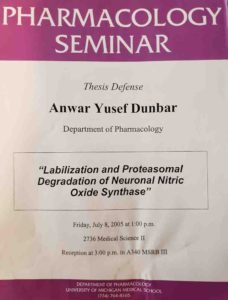
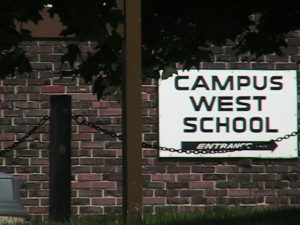
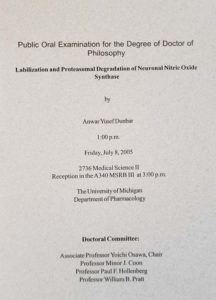
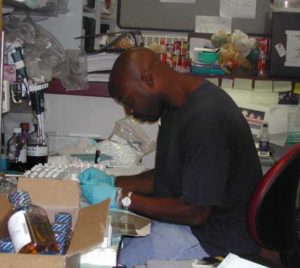
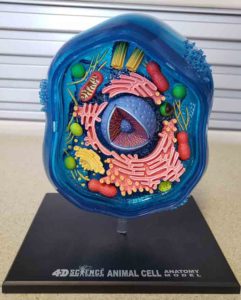
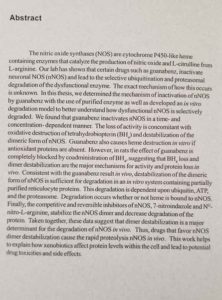
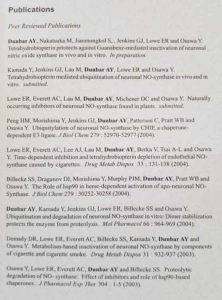
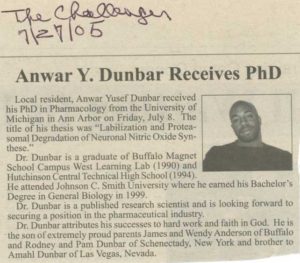
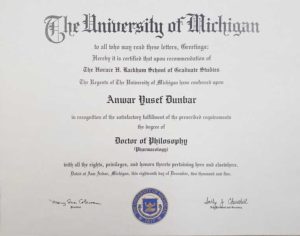
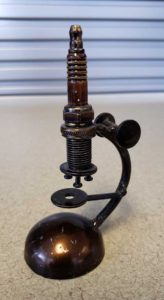
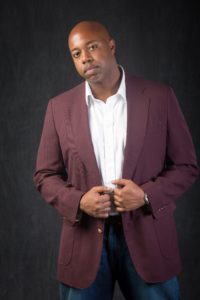
Dr. Dunbar, what an encouraging and transparent account on your journey to becoming a STEM professional. Thank you for sharing this! I will be forwarding this article for sure. Keep up the amazing work please!
Good morning Najiyyah. First, thank you for reading this piece and leaving a comment. I was concerned that I might’ve gone a little too long, and then thought of some other things I could’ve added in. I think it’s critical to share how we did things; teaching others how to fish. Otherwise they have to reinvent the wheel themselves so to speak which happens sometimes, but isn’t always necessary if people with the knowledge take the time to share their experiences. Thank you again.